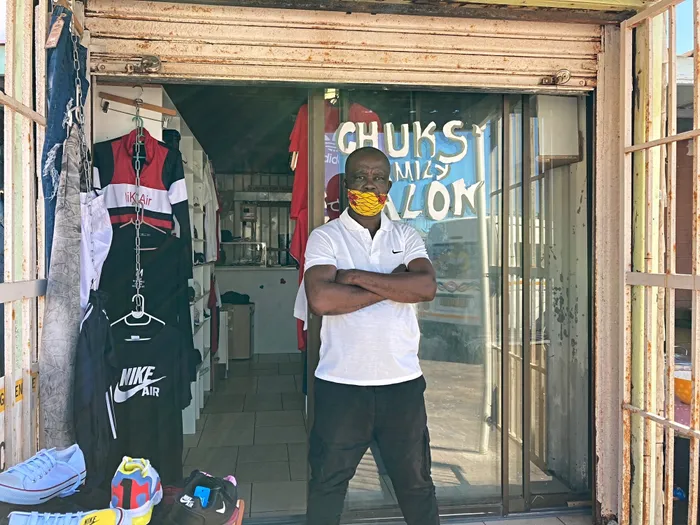Bayside Bazaar traders evicted

Chucks Nwanana in front of his container, Chucks’ Family Salon, in Bayside Bazaar.
The City of Cape Town is turning Bayside Bazaar into a parking lot.
The decades-old informal trading area opposite the Fish Hoek station has been home to informal traders for years.
However, with the new Fish Hoek informal trading plan, which was promulgated on January 22, Bayside Bazaar has now been declared a prohibited area for informal traders.
Mayoral committee member for urban management Grant Twigg said Bayside Bazaar had always been part of the road reserve under and was used for parking. The site, he said, would be handed back to the roads department and the area would be cleaned, hard surfaced and rehabilitated.
The few remaining traders have all received eviction notices and should have vacated their containers two weeks ago by Friday March 12 according to the letters from the City.
But for many, it is their only source of income, and the new informal-trading bays allocated to traders in Fish Hoek are uncovered and will require daily shop set up and have no storage space for stock.
Chucks Nwanana, 55, has been trading there since 2005 and runs a hair salon, Chucks’ Family Salon. He also sells shoes and clothing.
He initially started trading from an open air stall and was later given a container by the City.

Throughout the years he has built shelves in his container, tiled the floor, built a basin for washing hair, fitted a sliding door and a metal security gate. The City refuses to compensate him for the alterations.
He pays R462 a month for the use of the container and pays for his own electricity. He said he had never skipped a payment before except February and March due to the uncertainty of what would happen.
He said that while his business had taken a knock due to lockdown, he made a good living from his container and provided for his wife and 15-year-old son in Masiphumelele.

He said the new allocated bays were much smaller than his container.
“I will have to transport my stock to and from the area and set up shop every day. The City promised us they will give us new containers. There was never any agreement that we will trade in the new bays,” he said.
Another trader, Galiema Petersen, 70, who has been trading at Bayside Bazaar for 21 years said she was too old to set up shop every day and did not know where to store her stock. She occupies half a container, known as No 5 and pays R250 a month.
In her objection to the City’s draft informal trading plan, written in September last year, Ms Petersen states that she is the breadwinner for her family. She expressed concern about her stock, which she estimated to be worth R100 000, and suggested the City compensate her for it. But the City refused.
Ocean View community activist and founder of the Cape Flats Wellness Centre, Aslam Richards, who represents Ms Petersen said he had been communicating with the City but all requests for a meeting with the City had been refused.
He said many of the traders felt they had not been consulted about the matter, while the City insisted that meetings were held with the traders.
However, he said, when asked if the City could provide minutes to the so-called meetings, it could not.
Ocean View legal representative Abe Braaf, who represents all the traders, said his proposal to the City was to provide the traders with a space where they could continue trading in their containers. He said a City official who had served the traders with eviction notices by hand had told the traders that there was such a space available but had now gone back on his word.
Mr Twigg said the traders were renting the kiosks from the City month-to-month with an informal trading permit and any unauthorised structural modification to the kiosks was a violation of their agreements and the City could not be held liable for the costs incurred by the trader.
He said the traders could select from the newly gazetted trading bays around Fish Hoek and should make use of them.
Chairman of the Fish Hoek Valley Ratepayers’ and Residents’ Association (FHVRRA), Brian Youngblood, said Bayside Bazaar had never managed properly and had become an untidy mess.
Due to mismanagement, some traders charged “exorbitant prices” for other traders to use their facilities and no alternative products were offered, which resulted in traders becoming competitors of formal traders with similar stock items, he said.
“The City should provide rubbish bins and removal services, running water and toilets, street lights, regular electricity, adequate shelter and storage facilities,” he said.